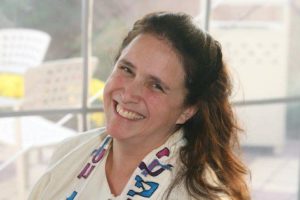The police that surrounded the women’s prayer gathering allowed my daughters and I to enter. Another row of police kept the Haredi men at bay, as best they could, on the men’s side of the plaza. My husband, Yosef, and our two sons, were in the center of the Haredi men. But our boys left. They were terrified. Rock throwing, spitting, chair throwing, obscenities. One man threw water on my eleven-year-old’s head. Not a big deal for most people, but our son wears cochlear implants to allow him to hear. The technology, prominent with wires and electric lights near his ears, was apparently a target for some man in his quest to own God.
Do I sound bitter? I am. So bitter that, in the midst of it all, my judgment failed. A rock hit a young girl near me and I stormed out of our large circle. Women, in tallises and tefillin, singing and praying, separated to let me through the dense crowd. I went to the police at the barrier that held back the Haredi men who were screaming, fists raised.
I reached the police and caught eyes with a Haredi young man and here’s where I went into autopilot. I walked, slowly, toward him. He panicked at the approach of a woman – a woman in a tallis! He tried to back away. He tried to move to his right and his left. But he was trapped by the “monochromatic rainbow” as my friend Yisrael Campbell described the Haredi crowd.
 I know I would not have gotten too close to him, certainly not within arm’s reach. But I smiled sardonically. Where you gonna run to, shmuck? His panicked face is the last thing I remember before I was flat on my back. The police had, justifiably, thrown me to the ground. And then quickly helped me up. What I didn’t know until I watched the video of the incident (of course there was a video to be found, almost everyone had cameras) was that after I got up, as I was yelling to the police about the little girl, a young, female, Ethiopian police officer gently replaced my fallen tallis on my shoulder.
I know I would not have gotten too close to him, certainly not within arm’s reach. But I smiled sardonically. Where you gonna run to, shmuck? His panicked face is the last thing I remember before I was flat on my back. The police had, justifiably, thrown me to the ground. And then quickly helped me up. What I didn’t know until I watched the video of the incident (of course there was a video to be found, almost everyone had cameras) was that after I got up, as I was yelling to the police about the little girl, a young, female, Ethiopian police officer gently replaced my fallen tallis on my shoulder.This officer then accompanied me back into the dense circle of women to check on the hurt girl. Seeing the girl was not seriously injured, the officer turned to exit the crowd. As she did, we both, instinctively, reached for one another’s hand, and squeezed.
I have spent a lot of time popping tums and ruminating over the past few days. On the little Haredi girls who are allowed only one narrow view of this big, beautiful world (and were described by one leading Haredi rabbi as “our victory” – because each one, he says, will have ten children*), who stuck their tongues out at us when we said hodesh tov and shabbat shalom. On the Haredi women who spat on us, one who slimed my nine-year-old, until her older sisters protected her and got spit on themselves. On the black-coated and hatted men who stood on the road, and atop the city walls, and threw stones at our buses, us hitting the floor inside as one rock pushed a window open, as we were spirited away in police-ordered buses after davening.
I’m trying to shift my focus now. To remember the police who protected us, especially the policewoman who shared my pain for a moment. To remember the Haredi girl at the wall who whispered to a friend, “I think what you’re doing is good.” To the three ultra-Orthodox girls who found my daughter, later, at a nearby mall, and said, quietly, “Thank you. We support you.”
These girls just may be able to pray one day from their own volition, truly and whole-heartedly. With my children.
* almost assuredly in poverty, given the statistics
Rabbi Susan Silverman is a writer and activist who focuses on adoption. She just completed a book: Casting Lots: How Raising My Children Helped Me Find God. She lives in Jerusalem with her husband, Yosef Abramowitz, and their five children.
(Photo: Women of the Wall photo from Wikimedia Commons, taken Jan 22, 2013)


